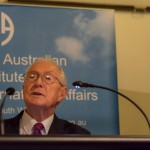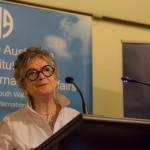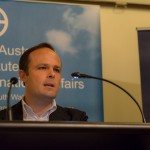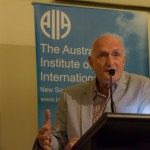Ted's Millennium
At Glover Cottages on 10 May, around 90 former colleagues and friends celebrated the life and literary talent of the late Ted Pocock AM. During his extensive diplomatic career, Ted had among other things been Australian ambassador to the Republic of Korea, the USSR, France, Belgium, Luxembourg and the European Union, and High Commissioner to Pakistan. During the latter stages of his career and afterwards, he wrote an extensive and wonderfully idiosyncratic history of the second millennium as seen through one individual in each century, some famous, others not. In describing Ted’s book at the event, former AIIA NSW President Geoff Miller said:
‘(Ted’s Millennium) is excellent in many ways. It’s a major work of scholarship, research and story-telling, enlivened throughout by Ted’s wit and talent for wry observation…The settings of the book’s essays reflect Ted’s and Meg’s own life experiences. They include Russia and Central Asia – Ted was ambassador in Moscow – Palestine, Cambodia – he was posted there – the US at the time of Jefferson, Bologna, Prussia at the time it became a Kingdom, Japan – in the person of Hideyoshi who tried to conquer Korea, where Ted was also Ambassador – and China.’
In the summary of his thousand page work, Ted noted four broad phases over the Millennium, all of which continue to resonate today. First was the growth of ethnically-based nationalism; second, the growth of imperialism, the conquest, rule and exploitation of others. These were followed by two phases manifested only in the 20th century. The first was of human and physical destruction and devastation: two World Wars followed by the appalling human costs of the totalitarian dictatorships of Lenin and Stalin, Hitler and Mao Zedong. The second 20th century phase, heavily influenced by the first, was a set of widely accepted objectives that turned out to embody inherent contradictions – establishment of the UN to prevent wars, dismantling of European colonial empires (but not others), and the proliferation of nation states, some of which were and continue to be highly antagonistic to others.
As Geoff Miller notes, Ted’s conclusions are not rosy. ‘Humanity’, Ted observed, ‘unfortunately, seems to be more marked by intolerance of all kinds than by any other characteristic’. But the book has much to offer the reader, who may be challenged by its length, but will find amazing nuggets of fact and wisdom along the way.
Report prepared by Richard Broinowski



